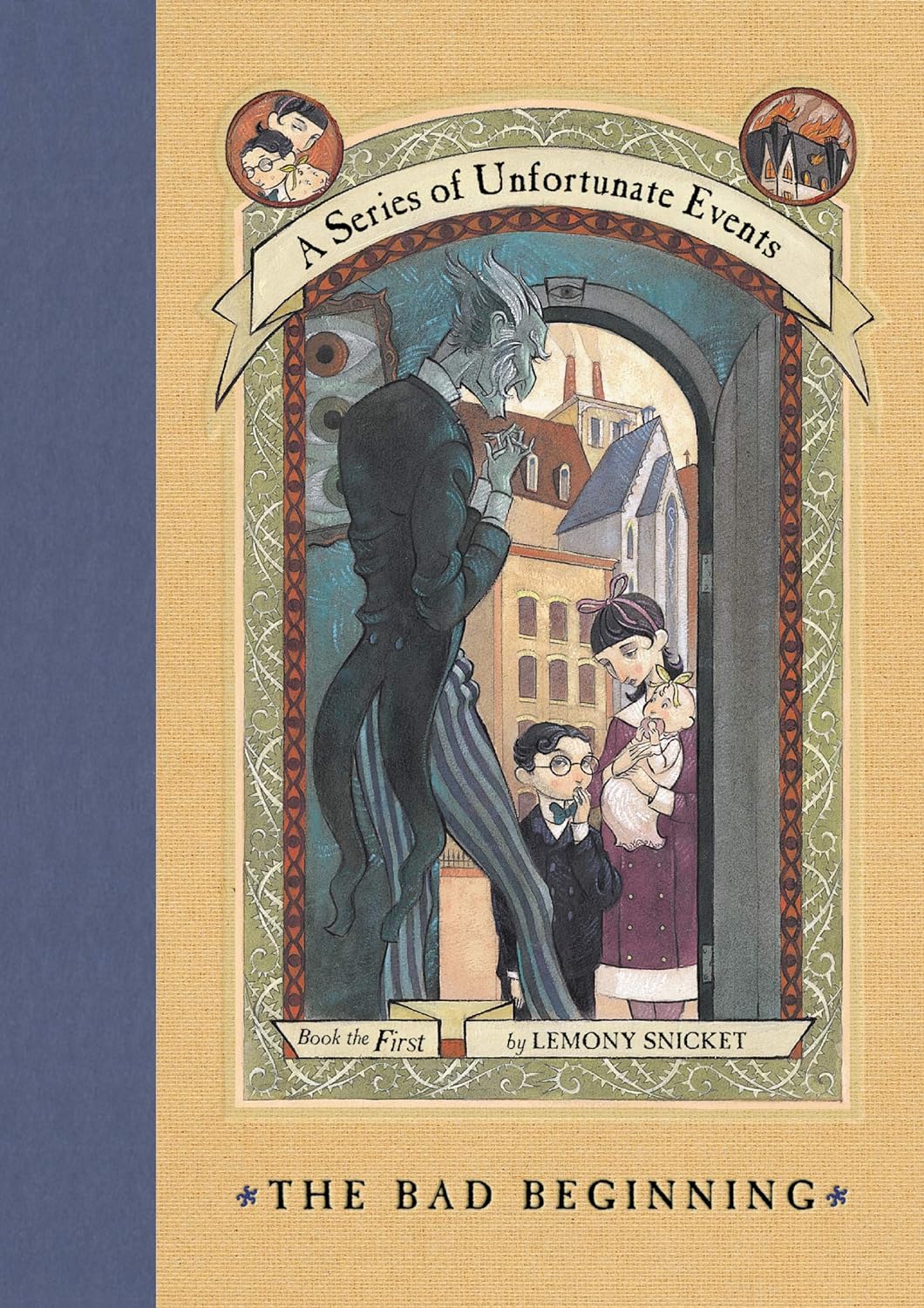The thirteen books in Daniel Handler’s A Series of Unfortunate Events provide humorous if formulaic escapism which, like an emergency room full of merely-competent doctors, does no obvious harm. While many contemporary children’s series positively ooze with socially-conscious messages that their authors or publishers think “The Children” need to hear, these books are mercifully bereft of such earnest nonsense. True, the series is also free of anything like transcendence, and it offers no remedy to the problem of evil that is its main source of drama (and humor), but at least it doesn’t promote any obvious baloney, only entertaining and erudite-lite buffoonery.
The basic plot, repeated with only slight variations over the course of thirteen books, is as follows: the Baudelaire children, having tragically lost their parents, find themselves at the mercy of a succession of adults, who occasionally care—just not as much as their parents. Even when these guardians are wholesome folks, they’re too naive or too skeptical to recognize the machinations of evil. Count Olaf, the orphans’ greedy relative, means to get his hands on the “Baudelaire fortune,” a term which here means, “a MacGuffin that serves both to motivate the villain and as a symbol of resources always just beyond the orphans’ reach.” Lacking any real parents, the Baudelaire orphans must learn to rely on each other and on each child’s unique abilities. Violet, the oldest, possesses absurdly good inventing skills. Middle child Klaus carries a veritable library inside his head. Sunny, the curiously intelligent baby-of-uncertain-age, has a knack for biting things, a propensity which later flowers into culinary skill. As their humorous tragedy unfolds, the Baudelaires find allies, lose (more) loved ones, and begin to peel the mysterious, tear-inducing, and pungent onion which is the mystery of their own family and its association with the cryptic VFD. Anachronisms, inside jokes, and intrusive narration abound.
Young readers will enjoy the atmosphere of intrigue and carefully managed dread that Daniel Handler skillfully creates. Both the story’s tone and its characters are consistently over-the-top, and even the books’ purported author, narrator Lemony Snicket, plays an in-world character. His intrusive narrations, wordplay, and numerous witty asides lend the books a very clear style, one which seems “familiar” in at least two senses of that word. More experienced readers will notice the constant peppering of literary references, the anachronistic, even ahistorical settings, and the metacognitive gimmicks, such as in-world references to “A Series of Unfortunate Events” within the pages of A Series of Unfortunate Events. Sometimes the cleverness becomes too much, and one begins to tire of certain stock phrases, yet Handler has enough tricks to keep the atmosphere fun. Beyond the author’s obvious interest in broadening his readers’ vocabulary, parents can rest assured that the series has no obvious agenda, though it does have a perspective on life that bears brief mention.
Handler’s universe is closed. As the events of “The End” make clear, the author sees the drama of human existence taking place without any outside help or transcendent hope. Handler’s world is not relativistic—it has real right and wrong, beauty and horror—but it is a closed loop. Outside lies “The Great Unknown,” the inaccessible mystery of what lies beyond death. Meanwhile, within this stoic landscape, good and wholesome people drift upon a rather hostile sea supported only by family, friends, and their individual skills and virtues. The books do not particularly reject God or religion, but they imply that surviving a little while longer, the universe’s creeping hostility, and keeping the heart’s embers from going entirely out are the main duties of human existence. Imagine Eclessiates narrated by Roald Dahl with strong doses of silly humor and without the Promised Land or a glass elevator, and you’ll have a fairly accurate sense of the series’ tone.
Handler’s skill as grim-but-wacky narrator makes the series good reading, and his focus on the story rather than “The Message” places this series several cuts above your average middle-grade series. The value set represented is neither Christian nor “Progressive,” nor is it especially hostile to either framework. Handler/Snicket’s world is a bit grim but very funny. His heroes never thrive, but they survive this vale of tears with a touch of humor and stiff upper lip. That perspective isn’t entirely right, but—as the Gen Zers say—it’s “not wrong.”



